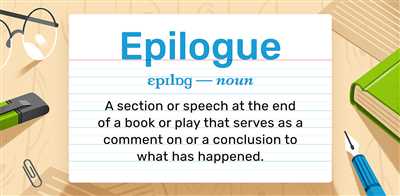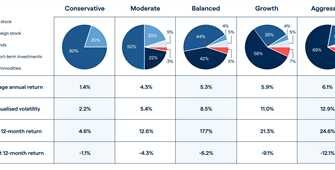
Epilogues are the final piece of a written work. They serve a variety of purposes, but their main function is to provide closure to the narrative. Writing a good epilogue is essential to leaving a lasting impression on your readers. It is where you tie up all the loose ends, make certain everything is clear, and leave them with a sense of satisfaction.
When writing an epilogue, it is important to keep in mind the purpose it serves. Identify what you want to achieve with your epilogue – whether it is to provide a glimpse into the future, offer a new perspective, or simply tie up loose ends. This will help you determine what sort of information to include and the tone to use.
One tip for writing an effective epilogue is to make sure it ties back to the main narrative. While it can be tempting to introduce new characters or storylines, it is essential to stay focused on the story that has already been told. The epilogue should bring everything full circle and provide a sense of closure.
Another important aspect to consider is the length of your epilogue. While some epilogues can be quite short, others can span several pages or even chapters. It depends on the overall length and complexity of your story. Remember, the epilogue should not feel rushed or hastily thrown together. Take your time to craft a well-thought-out conclusion.
In terms of formatting, epilogues are typically positioned at the very end of a book or written work. They usually come after the conclusion or afterword, if there is one. However, there are no hard and fast rules – it is ultimately up to you as the author to decide where the epilogue fits best within your narrative.
Writing an epilogue can be challenging, but it is an essential part of any story. It helps to tie up loose ends, provide closure, and leave a lasting impression on your readers. Whether you choose to include an epilogue or not, it is always important to consider the overall structure and purpose of your story. By taking the time to craft a well-written epilogue, you can ensure that your readers’ journey with your characters comes to a satisfying end.
What is an Epilogue
An epilogue is a section that comes after the main narrative of a book or story. It serves as a conclusion or a final note to wrap up loose ends and provide additional information or perspective. Epilogues are often used to jump forward in time and show what happens to the characters after the main events of the story.
Epilogues can take many different forms and have various purposes. Some epilogues are used to tie up loose ends and provide closure for the reader. They may reveal the fate of certain characters or provide a glimpse into their future. Other epilogues may serve to provide additional context or insights into the story, offering a different perspective or shedding light on certain events.
Epilogues can be short or long, depending on the author’s choice. They can be written in the same style and tone as the rest of the book, or they can have a different tone and voice. Epilogues can also be used to give readers a hint or teaser about a possible sequel or spin-off.
From a structural point of view, an epilogue is a separate section, usually located at the end of the book, following the last chapter. It typically starts with a clear heading, such as “Epilogue” or “Afterword”, to indicate its purpose. Epilogues can be written in the first or third person, depending on the narrative style of the book.
While epilogues are not always necessary, they can be a valuable addition to a book, providing readers with a sense of closure and resolution. Epilogues can also be used to analyze the events of the story and offer insights into the broader themes and messages.
It’s important to remember that, while epilogues are often used in fiction, they are not exclusive to that genre. Non-fiction books, memoirs, and even websites can also include epilogues or similar sections to provide additional information or reflections.
When writing an epilogue, make sure to consider its purpose and what you want to achieve with it. Think about how it ties into the main narrative and what information or insights you want to convey to the readers. An epilogue should be used intentionally and not as a filler or an afterthought.
In terms of HTML, an epilogue can be marked up using the
tag for paragraphs and the or tags for emphasis. The structure and formatting of the epilogue should reflect the overall design and style of the page or site.
Epilogues, like any other content, need to be mindful of legal requirements, such as data protection and privacy laws. If you collect and analyze user data, such as through Google Analytics or other third-party tools, you must obtain proper consent and ensure that the data is stored and used in a secure and compliant manner.
So, whether you decide to include an epilogue in your book or website, or not, is ultimately up to you as the author or creator. Just remember that epilogues can add a unique dimension to a story, providing closure, insights, or even a chance for further exploration of the characters and their world.
An epilogue is often mistaken for an afterword
In the world of writing and literature, it is not uncommon for an epilogue to be mistaken for an afterword. While both serve a similar function of providing additional information or closure, there are distinct differences between the two.
An epilogue is typically a section or chapter that comes at the end of a story or narrative. Its primary purpose is to tie up loose ends, provide closure, or offer a glimpse into the future of the characters or the world they inhabit. In a broader perspective, an epilogue helps to give readers a sense of the long-lasting impact of the story’s events.
On the other hand, an afterword is usually written by the author or a third-party and serves a different function. It may include insights into the writing process, behind-the-scenes details, or acknowledgments. While an afterword can also provide closure, it is not an essential part of the narrative itself.
One analogy that could help understand the difference is to think of the epilogue as the last chapter of a book and the afterword as a separate report or analysis of the book. The epilogue ties everything together from a narrative perspective, while the afterword provides additional context or reflection from the author’s point of view.
It’s important to remember that an epilogue is not always necessary, and whether to include one or not is entirely up to the writer. Some stories may benefit from the added closure and perspective, while others may end on a high note without the need for further explanation.
From a functional standpoint, websites sometimes use epilogues in a similar way. For example, they could be used to track user consent or to report and analyze user interactions with the site. In these cases, epilogues are often used to record essential information or to identify users into different categories or segments.
In terms of technical aspects, epilogues on websites often rely on the use of cookies or other tracking features. These cookies are installed on the user’s device and help the site remember certain preferences or settings. They could also be used to collect data that helps to analyze user behavior or to provide a more personalized experience.
While epilogues on websites can serve different purposes, it is important to note that user consent is always necessary. Websites must inform users about the use of cookies or other tracking technologies and ask for their consent before loading any epilogue-related features.
From a broader perspective, epilogues can also be seen as a gateway to other related sites or content. For example, a story-driven website could use an epilogue to provide a link to the next chapter or the next installment in the series. This helps to keep users engaged and encourages them to continue exploring the narrative.
In conclusion, an epilogue is often mistaken for an afterword, but they serve different functions in writing and literature. An epilogue provides closure and ties up loose ends in the narrative, while an afterword offers additional insights or reflections from the author. On websites, epilogues can be functional tools that help track user interactions, provide personalized experiences, or serve as gateways to other content. Whether in writing or online, epilogues play a unique role in enriching the overall experience for readers and users alike.
Tip Make sure your book actually benefits from an epilogue

Epilogues can be a useful tool for wrapping up loose ends, providing closure, or offering readers a glimpse into the characters’ future. However, not every book needs an epilogue, and including one without a clear purpose can detract from the overall reading experience. Before deciding to write an epilogue, consider the following factors to determine if it will truly benefit your book:
- Does your book have loose ends to tie up? If there are unresolved storylines or lingering questions that remain at the end of the main narrative, an epilogue can be a great way to address them and provide readers with a sense of completion.
- Is there a significant time gap? Epilogues are often used to jump ahead in time, showing readers what happens to the characters after the main events of the story. If your book spans several months or years, an epilogue can help bridge the gap and provide a glimpse of the characters’ lives in the future.
- Does the epilogue add something unique? Epilogues should offer something new or insightful that adds value to the overall story. It could be a different perspective on events, a behind-the-scenes look at what happens next, or an afterword from the author discussing their inspiration or intentions.
- Will an epilogue benefit your target audience? Consider your readers and the genre or category of your book. While epilogues can be a popular choice in certain genres, they may not always be essential. If an epilogue doesn’t serve a clear purpose or isn’t expected in your genre, it might be best to end the book without one.
Remember, when writing an epilogue, it’s important to maintain the same level of quality and attention to detail as the rest of your book. Pay close attention to grammar, pacing, and character development. An epilogue should enhance the reader’s experience, not feel like an afterthought or tacked-on ending.
Before publishing your book or posting it on a website, consider the features and purpose of the platform you’re using. Some websites may collect user data or enable third-party analytics without your consent, so it’s important to read and understand their terms and conditions. Make sure you’re aware of how your readers’ information is being stored and used, and always ask for consent when necessary.
If you’re working with a platform that uses cookies or cloud-based analytics, they may record certain information about your users for analytical purposes. However, it’s essential to be transparent about what data is being collected and how it is being used. You can include a clear privacy policy on your website or platform to inform users about their data being collected and stored.
At the end of the day, the decision to include an epilogue in your book is entirely up to you as the author. Just remember to consider the broader narrative and the needs of your readers. If an epilogue will truly benefit the story and provide a satisfying conclusion, then it can be a great choice to include one. However, if it feels forced or unnecessary, it’s better to leave the book open-ended and let the readers decide what happens next.
The Epilogue Choice is Yours
When it comes to writing an epilogue, there are certain choices that you need to make. The main point is that the epilogue should help to tie up any loose ends and provide a sense of closure to the story. Whether you decide to include an epilogue or not is entirely up to you, as the writer.
One of the first choices you’ll need to make is whether to write the epilogue from the perspective of a specific character or from a broader point of view. This choice will depend on the main theme of your book and what you want to achieve with the epilogue.
Another choice you have to make is what the epilogue should actually contain. It could be a few paragraphs or several pages long, depending on how much information you want to provide. The epilogue can be used to give readers a glimpse into the future of the characters, to explain what happened after the main events of the story, or to provide a deeper understanding of the broader world that the book is set in.
You also have the choice of whether or not to include an afterword in your epilogue. An afterword is a chance for you, as the writer, to reflect on the process of writing the book and to share any insights or tips you have for other aspiring writers. It can often be a unique and interesting addition to the epilogue.
While making these choices, it’s important to keep in mind the benefits of using cookies on your site. Cookies can help track user activity and enable certain features to function properly. They can also be used to analyze and report on user data, which can be essential for improving the user experience. However, it’s always important to obtain the consent of your users and to only collect the necessary data for the purpose of improving your site.
From a technical perspective, there are several third-party tools and services that can help with the implementation of cookies on your site. For example, Google Analytics is a widely used tool that helps track and analyze user behavior on websites. Stripe is a popular payment gateway that can be used to securely process payments and store payment information in the cloud.
It’s worth noting that cookies are not always used for tracking users. Sometimes, they are necessary for the proper functioning of certain features or to remember user preferences. Functional cookies, for example, are used to enable certain features on your site and ensure that everything loads properly.
In conclusion, whether or not to include an epilogue in your writing is entirely up to you. The epilogue can provide a unique perspective, tie up loose ends, and provide closure to your story. Just make sure to make the choices that align with the main purpose and themes of your book. And remember, when it comes to using cookies on your site, transparency and obtaining user consent are always key.









